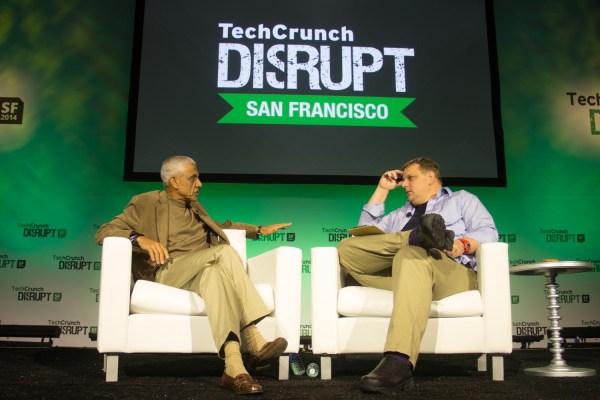Today at Disrupt SF, TechCrunch founder and alum Michael Arrington interviewed venture capitalist Vinod Khosla in a conversation that covered a number of topics including egg substitutes, animal cruelty, city design, Uber, the usefulness of most members of the professional investing community — and one of Khosla’s newest interests, machine learning.
Parts of it were a reprise of sorts, as Arrington and Khosla have previously tangled about Hampton Creek, a company that creates a plant-based egg substitute and Khosla Ventures investment. And so, Arrington endured yet another taste test on stage of two sets of cookies, some made with eggs, and some made with a non-egg substance.
A consensus on the efficacy of replacing eggs, and the importance of Arrington’s growing chickens at home, wasn’t reached.
What was established instead, in the waning moments of the interview was Khosla’s interest in smart machines and robotcs (a subject he’s touched on in a discussion with Sergey Brin and Larry Page). On the TechCrunch stage Khosla unveiled two new portfolio companies (the still in stealth) MetaMines and the not-quite-as-stealthy Scaled Inference.
Perhaps most interesting in the discussion was Khosla’s assertion that, “In the next 20 years, machine learning will have more impact than mobile has.” I suspect that most people familiar with the promise of machine learning doubt that it will have a large impact on technology, and the world, when it becomes more intelligent, but at the same time, mobile has a proven track record of changing the world. It’s a large claim to make, especially since mobile will only continue to have a greater impact itself, as smartphone and tablet penetration rise around the world.
Regarding other venture capitalists, Khosla was willing to stand behind his previous assertion that 95 percent of venture capitalists add no value to companies that they invest in, and 70 percent actually bring negative value.
Yesterday, Clayton Christensen said that it was not “clear to [him] that Uber is disruptive.” Khosla found the asseration silly, raising the idea of the compound impact of one large disruption paired with a second large disruption. His example — Uber itself, paired with driverless cars — detailed the idea that a single innovation can perhaps have magnitudes greater impact when linked to a separate new technology or idea. Uber can reduce the cost of getting around your city — depending on where you live — but assuming a lower per-ride cost using a driverless car, it would become dramatically cheaper than owning your own set of wheels.
After being asked by Arrington how many cars he owns, Khosla stated that he owns “a lot of cars,” but that he would be “happier” to not own a vehicle. The venture capitalist said that he was disappointed in Christensen.
And finally, Khosla looked at Secret, which recently raised a large chunk of money, saying that he had looked at the company, and weighed whether it fell in the positive, or the negative, and decided it was neutral.
[gallery ids="1055946,1055945,1055944,1055943,1055942,1055941,1055939,1055938,1055937,1055936,1055935,1055934,1055933,1055932"]
